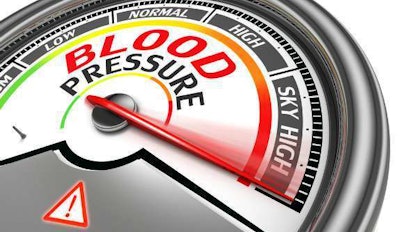

 The AHA redefined high blood pressure in November.
The AHA redefined high blood pressure in November.Nearly half of all American adults have high blood pressure, according to a Jan. 31 update from the American Heart Association (AHA).
AHA’s latest research found that about 103 million U.S. adults have high blood pressure. High blood pressure increases an individual’s risk for heart attacks, strokes and other serious ailments by causing damage to blood vessels.
In November, the AHA redefined high blood pressure as readings of 130 mm Hg and higher for the systolic measurement (top), and readings of 80 or higher for the diastolic (bottom) measurement.
High blood pressure has long been known to be common among truck drivers, and these recent updates indicate it could be even more common in the trucking industry than previously thought. The good news is it can be managed with lifestyle changes and, in many cases, medication.
AHA recommends the following lifestyles changes for managing high blood pressure:
- Eat a well-balanced, low-salt diet
- Limit alcohol
- Enjoy regular physical activity
- Manage stress
- Maintain a healthy weight
- Quit smoking
- Take your medications properly
Some of these changes may seem impossible or difficult if you’re an over-the-road trucker, but there are things you can do to help reduce your risk of high blood pressure:
- Investing in a slow cooker can help you prepare healthy, homemade meals with minimal effort, so that you can avoid fast food dinners. Cooking your own food means you can also control how much sodium is in it.
- For fitness, there are bodyweight exercises and others using the truck that you can do. Remember to take it easy in the beginning and set realistic expectations for yourself. This will help you develop a consistent routine and avoid getting overwhelmed and quitting in the beginning.
- The St. Christopher Truckers Relief Fund offers a free “Rigs Without Cigs” program for truckers to help them quit smoking. Smoking increases the risk of high blood pressure and causes other health problems, so quitting can improve an individual’s overall health.
If you suspect you may have high blood pressure or you have a family history of it, talk to you doctor for personalized recommendations on how to lower your risk and whether you may or may not need medication.
As part of American Heart Month, which takes place each February, here’s some previous tips for dealing with high blood pressure:
- Here’s the right way to read your blood pressure
- 10 ways to reduce sodium in your diet
- Walking makes good sense for your heart
- These 6 things may raise your blood pressure
- 5 facts you should know about high blood pressure
- 7 blood pressure monitors for in your truck
As always, be sure to consult with your health care provider before undertaking rigorous exercise or other significant lifestyle changes or if you have reason to believe you may have high blood pressure.








